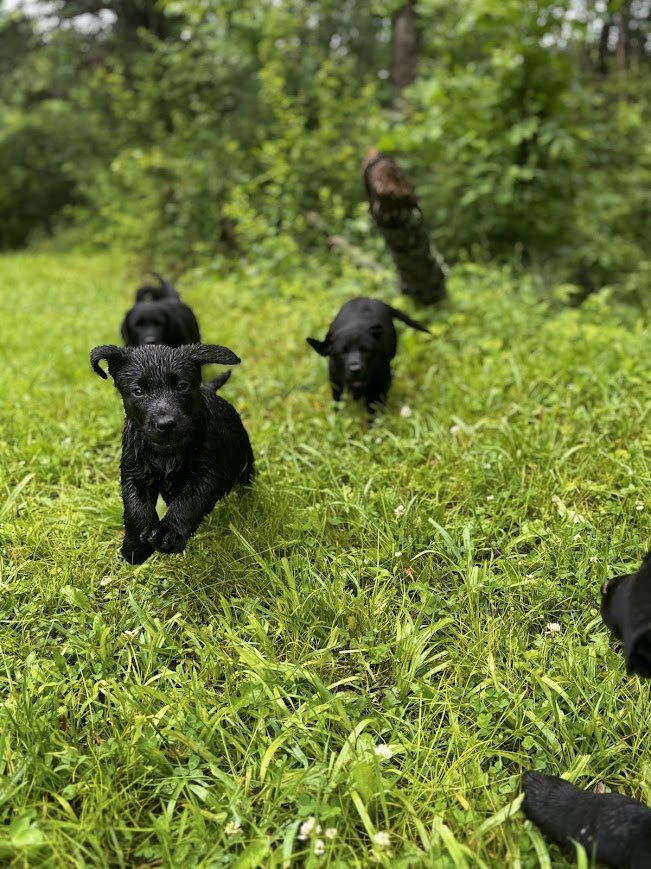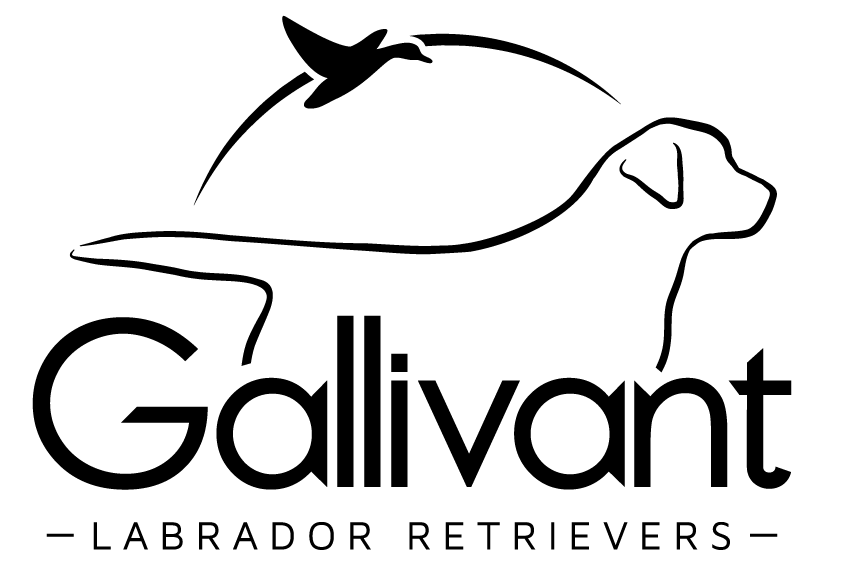Our Advanced Manners Program
At Gallivant, we offer our new puppy families the option of an extra 4-6 week Advanced Manners Program. This program has a single goal: ensuring that each puppy has the absolute best start in their new life! During these weeks, puppies build on the foundation we’ve already given them, helping them gain valuable experience and practice important skills. In this blog post, we’ll explain how our Advanced Manners Program works and why it makes such a big difference for our puppies and their new families.
Environmental Stimulation
Environmental stimulation begins the very day our puppies are born. From that first day onward, each puppy is gently handled every day and gradually introduced to the everyday sights, sounds, and sensations of the world — the hum of the vacuum cleaner, the scents of other animals, the vibrations of a washing machine, and much more.
In our Advanced Manners Program, we build on this strong foundation by providing daily opportunities for puppies to encounter something new and enriching. During these 4-6 weeks, the pups experience all kinds of weather, they get dirty and muddy, splash through puddles, watch curiously as trucks arrive into our driveway, take daily trips to the lake, the woods and the open fields - all at their own pace and with plenty of encouragement.
We cannot stress enough how crucial early environmental stimulation is for your puppy’s development. Puppies raised in sterile, unstimulating and never-changing environment never develop vital coping skills. These are the dogs that panic at passing cars, cower at the sound of a hairdryer, or bark frantically at the sound of a door slamming shut. With our Advanced Manners program we ensure that our puppies are equipped with the confidence and experience to embrace their new life without fear or stress.
Proper Socialization
Socialization is the process through which puppies are introduced to - and form social relationships to - other animals and humans. From the ages of around 3 weeks to 14 weeks, puppies enter what we call a “critical” or “sensitive” period. During this time, a puppy’s brain is especially open to forming healthy social relationships, making it vital that they meet trustworthy animals and humans and form positive associations with them.
Emphasis on trustworthy. We’re fortunate to have a whole team of well-socialized adult dogs who patiently tolerate impolite puppy behaviour, and who maintain a great balance between being playful and being gentle. Many of our puppy buyers don’t have that luxury. Interactions between puppies and adult dogs not only serve to help the puppies associate other dogs with good feelings, but also allows them to develop the crucial ability of behaving politely and appropriatly around other dogs.
Dogs have their own social language, and adult dogs are able to reprimand an impolite puppy far better that we ever will. Puppies that graduate our Basic Manners Program arrive at their new homes already understanding that other dogs won’t always tolerate that you bite, tug or jump on them - in fact, they may get angry and scold you! This knowledge is invaluable and can prevent a bite later in life.
We’re also lucky to always have a steady flow of visitors who love to greet, play with and handle the puppies. On top of that, our farm is home to cats, chickens, guinea pigs, and horses - giving our puppies the chance to learn that other animals are friends, not toys to chase or bite. Many of our puppy buyers have other pets at home, and they can breathe easy knowing their puppy already understands how to coexist calmly with other animals.
Crate-training
There are many opinions out there about crate training, but in our experience, it’s an essential skill for any puppy. Crate training aids in housebreaking, gives your puppy a safe place to rest, and allows you to control what your puppy can access when you can’t supervise them directly. Labradors, in particular, are notorious for swallowing things that they shouldn’t. This can be extremely dangerous and often requires expensive emergency surgery. For that reason alone, we always recommend that our puppy buyers crate their puppies when they’re home alone.
Even if you don’t plan to crate your puppy regularly, it’s important to remember that at some point your dog will almost certainly be crated: during car rides, vet visits, grooming appointments, or while boarding at a kennel or daycare. To make this as stress-free as possible, we introduce crate training from 8 weeks onward. Puppies nap in their crates from the start, beginning with short sessions that gradually increase in duration as they become comfortable. By the end of our program, our puppies sleep through the night in their crates. We use praise and treats to ensure the crate becomes a place they’re happy to be in. Before long, our puppies run straight into their crates, ready to settle down and rest.
Essential Life Skills
We consider crate training to be an essential life skill, but it’s just one of many valuable skills we focus on during our Advanced Manners Program. We also work on teaching puppies to walk politely on leash, to feel comfortable having their nails trimmed, ears cleaned, and coats washed - all things that will make life much easier at home, at the vet, and at the groomers! In addition to trimming their nails with traditional clippers, we also get our puppies comfortable with having their nails dremeled. Dremeling is an excellent way to keep your dog’s nails short and smooth, but it does require some getting used to. The sound and sensation can be unfamiliar at first, so we begin gently introducing the dremel from 8 weeks of age to help desensitize them to the activity.
Housebreaking is another area where we lay the groundwork for success. We follow a consistent routine of feeding, play, and rest, which helps us predict when the puppies will need to relieve themselves. After every nap, play session, and meal, we take the puppies outside. This helps them learn from the start that going to the toilet happens outside - setting them up for smooth house training in their new homes.













